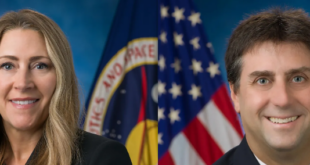
During the fifth Space Café Canada event, host Jessica West of Project Ploughshares sat down with Paul Meyer, a global expert on arms control and diplomacy in outer space, to discuss why efforts to agree to restrictions on the use of weapons and other military restraints has been so difficult.
Paul Meyer is a former Canadian Ambassador to the United Nations and the Conference on Disarmament in Geneva, a founding fellow of the Outer Space Institute, and currently Adjunct Professor of International Studies at Simon Fraser University in Vancouver.
More and more weapons systems that target objects in outer space are being developed and tested, so the stakes are high. This discussion examines the past, present, and future of arms control in outer space. It’s not rocket science … or is it?
How does the Conference on Disarmament fit into arms control efforts related to outer space?
The Conference on Disarmament (CD) is a 65-member forum of states in Geneva mandated to negotiate multilateral arms control and disarmament agreements. The topic of the prevention of an arms race in outer space (PAROS) has been on its agenda since 1982.
The CD works on a strict consensus basis. The lack of consensus regarding how to address the PAROS item (some favouring a new legally-binding agreement others preferring only politically binding measures) has hampered progress on this topic. More broadly PAROS has also been a victim of a general stalemate in the Conference that has prevented any substantive work on core issues since 1996 when the Comprehensive Test Ban Treaty (CTBT) was negotiated.
Canada has been at times a key actor in the CD on the topic of PAROS. Canada launched its first telecommunications satellite – the Allouette – in 1962 and has a vested interest in being able to maintain secure access to and use of space for a variety of functions, including remote sensing. Canada also has a long history of advocacy and activism on issues of multilateral arms control and disarmament.
Why is arms control in outer space so important to you personally?
From the time of the introduction of telegraphy, the international system has had to accommodate new technologies. Yet as a diplomat, I found the way in which the system had not invested in conflict prevention, as opposed to managing conflicts or engaging in post-conflict mopping up efforts, deeply dissatisfying. Why haven’t we been able to find the right strategies to prevent conflicts that were looming around us and are quite clearly detrimental to our interests? In recent years, space has become so much more important for global well-being as well as global security.
“Every country in the world is in some way a user of satellite enabled services. This demands efforts at trying to preserve outer space for peaceful purposes so that ever more important benefits can continue to be enjoyed by all, without fear of human-made threats.”
What is the problem that arms control is intended to solve in outer space? Is it primarily a legal or a technical one?
On the one hand, the international community is well served by having an early foundational treaty, the Outer Space Treaty of 1967, which specified some vital conflict prevention provisions, notably that outer space is a global commons, beyond any claim of sovereignty or national appropriation. When you recall how many wars here on Earth have been a function of clashing claims of sovereignty or territorial disputes you can appreciate how important that provision is as a conflict prevention measure. Also, the specific orientation of the treaty is towards the peaceful use of outer space “for the benefit and in the interests of all countries”. And the treaty itself is replete with elements of international cooperation, recognizing that this was an exciting and potentially hugely beneficial environment for cooperative human activity. There are also very specific prohibitions regarding any orbiting of weapons of mass destruction or any militarization of the Moon and other celestial bodies.
But the Outer Space Treaty has some weaknesses. There is no provision for follow up or institutional support, which is now standard in any multilateral agreement. This means that states parties have not once been able to meet to talk about the state of health of the treaty, and whether other steps might be needed. There are also some states that have problems with the constraints that the treaty does specify and are trying to wiggle their way out of it, partly by ignoring it, and partly by saying that our military activity is not aggressive and is not a threat to other states.
So, while we must appreciate the crucial role of the existing governance regime and its enduring value, it needs to be reinforced and consolidated to make it more effective. There is an annual resolution at the UN General Assembly that has been adopted with near universal support every year that says exactly that: while the current regime is great, it would be a grave threat to international peace and security if an arms race got underway, and that further measures are needed to prevent this and enhance the effectiveness of the regime.
“But the resolution on PAROS has been on the UN agenda for over 40 years now.”
One challenge is that the PAROS resolution, despite its wide support, is an example of declaratory policy that has become ritualized without states actively engaging in diplomatic efforts to realize its aims. It took external events, notably the revival of destructive ASAT testing starting in 2007, to revive interest in the topic. Alas, sometimes rising tensions and fears can have a positive effect on re-energizing diplomacy. And I think that we are seeing signs of that dynamic with respect to outer space.
Forty years is a long time not to have achieved agreement on PAROS. What are the key obstacles?
Our exploitation of outer space is somewhat Janus faced: on the one hand, there is a strong tradition of international cooperation that has accomplished some remarkable achievements, such as the International Space Station. On the other hand, there are on-going efforts to achieve military superiority in outer space. The latter explain in part the failure to make progress on arms control as there are those who believe that their military advantage in space could somehow be constrained or even neutralized through international agreements, and they are thus loath to enter into them.
For many years, multilateral discussion of arms control in space would be cut off by declarations that there was no arms race in outer space, so no need to have arms control there. It’s taken time for this situation to evolve. But since 2007, the gap between declaratory policy about the peaceful use of outer space and the reality that counterspace capabilities are being developed and tested, has become more evident.
What is the role of voluntary or politically-binding agreements, such as the Hague Code of Conduct?
“I don’t think that we should get hung up over the particular status, legal or political, of agreements. Ultimately, what’s most important is that states achieve substantive agreement on specific measures.”
If all countries are showing good will and good faith in agreeing to a specific measure of restraint, then I think it is of secondary significance whether that measure is framed as legally-binding or politically so.
We should recall that the Outer Space Treaty also includes a menu of transparency and confidence-building measures, such as encouraging visits to launch sites, consultations, and scientific exchanges. There is a menu of steps available that, if countries are really desiring progress on space security, may provide a basis for agreement.
How is space related to other arms control challenges here on Earth?
Military operations are heavily dependent on space assets, which make them vulnerable to interference; early warning systems and nuclear command and control capabilities are a particular concern. Ballistic missile defence with its occasional vision of placing interceptors in space is another source of destabilizing overlap. I refer to this problem as the “devil’s triangle” between space security efforts, nuclear arms control, and missile defence (read more here).
What are the missed opportunities that we should be aware of?
Middle powers certainly could have done more to reign in great power rivalry in space.
“It’s incumbent on states with space capabilities and diplomatic and technical expertise to step up and show that there are alternatives to an arms race in space, which we are all pledged to prevent, rather than acting as passive onlookers.”
Going forward, the debris implications of destructive weapons in space provides a common interest and prompts a certain degree of restraint among space actors with such capabilities. This common ground might serve as a basis for diplomatic agreement.
How does the new Open Ended Working Group (OEWG) on norms of responsible behaviour in outer space fit into this picture? Are there possible points of consensus?
“I’m a big believer in creative diplomacy. And this initiative – led by the United Kingdom (UK) – is an example of a creative response to the existing obstacles facing space arms control.”
The Working Group is mandated by the UN General Assembly, which works through majority rule, thus allowing it to be created while circumventing the consensus straitjacket of the CD. It’s also open to broad participation, and thus more inclusive than the 65 Member States of the CD. Rather than a focus on control over specific weapons systems, the OEWG emphasizes control of conduct, meaning that it may be able to get around some of the protracted disagreements on definitions of a space weapon. Finally, it draws strength and credibility from earlier and current work at the UN on norms of responsible state behaviour for cyberspace.
Although the OEWG is mandated by the UN General Assembly, it will conduct its work through consensus. Possible points of agreement include a ban on the testing of kinetic or debris causing anti-satellite weapons, which represents in my view “low hanging fruit” for the international community, whether it’s legally-binding or not.
Russia has already forced the first substantive meeting of the Working Group to be postponed. What are the diplomatic implications of the current situation in Ukraine?
We are all still recovering from the shock of the Russian invasion of Ukraine and the massive violation of international law and respect for the sovereign independence of states that it represents. So, in hindsight, it may be just as well that we are not beginning the deliberations of the Working Group at this precise moment.
Regardless of the troubling actions in Eastern Europe, diplomacy must keep active even at time when the guns have started to fire; without diplomacy there is no off ramp for military escalation and war and this role is relevant to the space security case as well. Once again, I come back to the clear common interest of all space users, among which Russia figures significantly, in trying to minimize threats to their space systems, on which Russia is just as dependent as anyone else.
Is there a role for non-state actors in in this process?
We have seen incredible private sector growth recently in outer space, with more to come, creating powerful new stakeholders in responsible activity by states in space. These private actors won’t be happy if irresponsible state behaviour ends up destroying their business models or commercial interests. Industry has never been shy about lobbying governments when their commercial interests are in jeopardy. Notably, we have seen growing engagement by the IT industry in the development of norms of behaviour in cyberspace. Regrettably, it’s still not clear what opportunities the private sector or civil society will have to input into the space OEWG.
How do you respond to skeptics who point to the current war in Ukraine as evidence that arms control restraints don’t work?
Such skepticism really isn’t warranted. All laws – even our own criminal codes – are violated on a regular basis, but this doesn’t suggest that they should be abandoned. At the multilateral level we have many examples of cooperative security agreements that have fared very well. Most agreements have provisions for dealing with perceived violations, but of course preventing non-compliance with arms control accords is a key part of their elaboration., Implementation can be promoted through developing clear definitions, verification measures, and provisions for responding to compliance issues by means of clarification and consultation. But ultimately international diplomacy is premised on the notion that you can’t force a state into any agreement. States adhere to arms control agreements voluntarily and with that voluntary engagement is the assumption of responsibility that those commitments will be honoured and that other states will respond appropriately if they are not. This model for international security cooperation has served us very well.
What is the one most important thing that is needed to achieve progress on arms control in outer space?
“It’s something of a cliché to say, but a strong injection of political will would be very helpful.”
There are eminently compelling and practical reasons for establishing some cooperative security measures for outer space. They do need however to have political backing. For example, I was pleased to see Canada renewing its long-standing proposals to ban destructive ASAT testing in space. I think it would be helpful for Canada to also begin the necessary diplomatic work to generate a coalition to support it, and to put the proposal in an appropriate forum. This issue needs a champion.
I would also argue that the emerging role of the private sector could be beneficial to providing additional steps toward restraint and cooperation in outer space.
To listen to the Space Café Canada Session, you can watch the full program here:
 SpaceWatch.Global An independent perspective on space
SpaceWatch.Global An independent perspective on space




